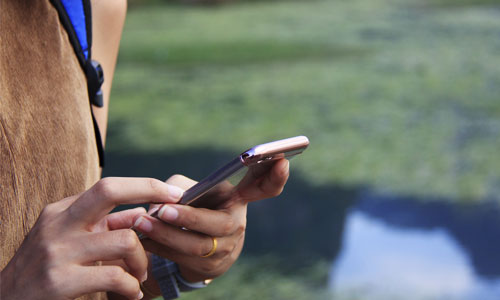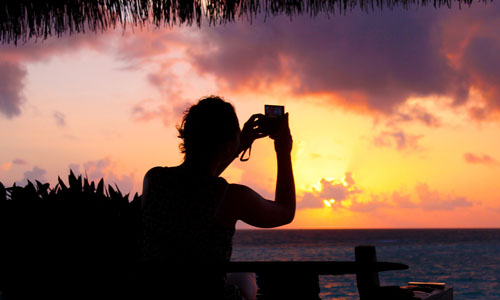Screen Time vs The Great Outdoors
Author

A keen runner, skier and nuts about cycling. Karl lives in Cumbria, where he loves encouraging his two children to follow in his outdoor lifestyle. Whilst out and about keeping active, Karl keeps a diary and shares it with Outdoor Look.
 Traveling and exploring the great outdoors will always be a passion of mine, but when I'm not out exploring the wilderness, you'll often find me on my phone, browsing the internet, like seemingly everyone these days. Problems can tend to emerge when these two pastimes inevitably overlap - sometimes you'll find yourself out on the trail, having the experience of a lifetime, but too distracted by your phone and the internet to truly enjoy what's in front of you.
Traveling and exploring the great outdoors will always be a passion of mine, but when I'm not out exploring the wilderness, you'll often find me on my phone, browsing the internet, like seemingly everyone these days. Problems can tend to emerge when these two pastimes inevitably overlap - sometimes you'll find yourself out on the trail, having the experience of a lifetime, but too distracted by your phone and the internet to truly enjoy what's in front of you.
To be sure, the internet and the mobile age has brought with it a great number of positive improvements for society. We've entered a more connected world, where physical distance no longer necessarily leads to emotional distance. The ability to more easily, and instantly, keep up-to-date with the latest goings-on in the world has brought great benefits for society and humanity as a whole.
However, we must also acknowledge the downsides of this creeping, unending expansion of technology into our lives: it has shortened our attention spans. Already, national parks and areas of natural beauty - places where mobile phone signal is often sparse and WiFi is nowhere to be seen - have become, for many, welcome respites from the world of the unending notification tones, which assemble themselves into a todo list of emails demanding responses, and clickbait news articles vying for our attention.
 There was a time when the idea of expanding WiFi and internet connectivity to every corner of the globe seemed like a welcome prospect to many. But as our lives have come to be more and more dominated by screen time, some of us have come to value what little chance we get to tear ourselves away from our devices. Where I used to get frustrated as I looked at my phone to find it could pick up no signal, I now feel a moment of relief as I realise I am released from my urge to check social media and reply to my messages.
There was a time when the idea of expanding WiFi and internet connectivity to every corner of the globe seemed like a welcome prospect to many. But as our lives have come to be more and more dominated by screen time, some of us have come to value what little chance we get to tear ourselves away from our devices. Where I used to get frustrated as I looked at my phone to find it could pick up no signal, I now feel a moment of relief as I realise I am released from my urge to check social media and reply to my messages.
This is not to say that internet connectivity in the wilderness is necessarily a bad thing, or even that it shouldn't be expanded. If mobile coverage were to reach 100% of the country, all of a sudden it would become much, much harder for people to become stranded in precarious situations with no way of contacting rescue workers - up a mountain, or out in a forest. Apps that allow us to read maps, look up information, and contact our friends are all extremely valuable tools when we're out on the trail, and are a fine example of the ways in which modern technology improves our lives and, sometimes, even saves them.
The key is to find the ideal balance between harnessing the advantages of modern technology, and retaining the ability to put down our devices and focus on something else at the right time. In the grand scheme of things, smartphones and even the internet are still relatively new technologies, and I have to say that as a society, I don't feel that we've yet found that balance.
So the next time you're out hiking and you take a look at your phone only to find that it's woefully devoid of connectivity, try to look at the situation positively: you're free to explore the natural world, without the urge to stop and stare down at the screen in your hand. Enjoy yourself!
Author

A keen runner, skier and nuts about cycling. Karl lives in Cumbria, where he loves encouraging his two children to follow in his outdoor lifestyle. Whilst out and about keeping active, Karl keeps a diary and shares it with Outdoor Look.
Categories
- Sport (28)
- Product Reviews (3)
- Team Outdoor Look (7)
- Mike Wild (2)
- Mike Payton (2)
- Suse Hammond-Pears (3)
- Snowboarding (12)
- Latest Offers (105)
- Shop Talk (1)
- Competitions (7)
- Walking (413)
- Lifestyle Fashion (8)
- Travel (86)
- Kit Guides (176)
- Workwear Clothing (6)
- Safety Workwear (4)
- Health/Fitness (289)
- Skiing (91)
- Great Outdoors (1316)
- Cycling (92)
- January 2025
- December 2024
- November 2024
- October 2024
- September 2024
- August 2024
- July 2024
- June 2024
- May 2024
- April 2024
- March 2024
- February 2024
- January 2024
- December 2023
- November 2023
- October 2023
- September 2023
- August 2023
- July 2023
- June 2023
- May 2023
- April 2023
- March 2023
- February 2023
- January 2023
- December 2022
- November 2022
- October 2022
- September 2022
- August 2022
- July 2022
- June 2022
- May 2022
- April 2022
- March 2022
- February 2022
- January 2022
- December 2021
- November 2021
- October 2021
- September 2021
- August 2021
- July 2021
- June 2021
- May 2021
- April 2021
- March 2021
- February 2021
- January 2021
- December 2020
- November 2020
- October 2020
- September 2020
- August 2020
- July 2020
- June 2020
- May 2020
- April 2020
- March 2020
- February 2020
- January 2020
- December 2019
- November 2019
- October 2019
- September 2019
- August 2019
- July 2019
- June 2019
- May 2019
- April 2019
- March 2019
- February 2019
- January 2019
- December 2018
- November 2018
- October 2018
- September 2018
- August 2018
- July 2018
- June 2018
- May 2018
- April 2018
- March 2018
- February 2018
- January 2018
- December 2017
- November 2017
- October 2017
- September 2017
- August 2017
- July 2017
- June 2017
- May 2017
- April 2017
- March 2017
- February 2017
- January 2017
- December 2016
- November 2016
- October 2016
- September 2016
- August 2016
- July 2016
- June 2016
- May 2016
- April 2016
- March 2016
- February 2016
- January 2016
- December 2015
- November 2015
- October 2015
- September 2015
- August 2015
- July 2015
- June 2015
- May 2015
- April 2015
- March 2015
- February 2015
- January 2015
- December 2014
- November 2014
- October 2014
- September 2014
- August 2014
- July 2014
- June 2014
- May 2014
- April 2014
- March 2014
- February 2014
- January 2014
- December 2013
- November 2013
- October 2013
- September 2013
- August 2013
- July 2013
- June 2013
- May 2013
- April 2013
- March 2013
- February 2013
- January 2013
- December 2012
- November 2012
- October 2012
- September 2012
- August 2012
- July 2012
- June 2012
- May 2012
- April 2012
- March 2012
- February 2012
- January 2012
- December 2011
- November 2011
- October 2011
- September 2011
- August 2011
- May 2010
- April 2010
- March 2010
- February 2010
- January 2010
- November 2009
- October 2009
- September 2009
Submit a Comment